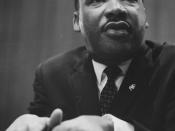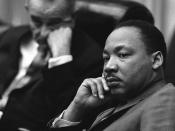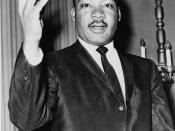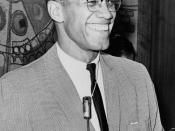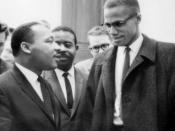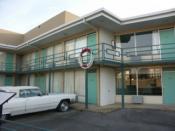Comparison and Contrast Malcolm X and Martin Luther King Jr. were both activists during the time of racial segregation. Malcolm X was mainly an orator of a religious sect, while Doctor King was a pastor at his local Baptist Church. They both had similar beliefs, but had different views on how to achieve their point. Still both thought about how to earn their freedom to be equal with the white man.
Malcolm X thought that this problem should be solved immediately, yet Dr.
King thought he it was going to take time. Malcolm X felt strongly about results happening now. Doctor King said it would be a long time and did not lie about it, unlike Malcolm X. In contrast to other black religious leaders of that time who espoused pacifism, which meant he supported peace. Malcolm X called for achieving equality "by any means necessary." The main opponent of King's moderate policies was SNCC.
SNCC stood for Student Non-Violent Coordinating Committee. Black Power advocates were influenced by Malcolm X. They viewed Malcolm's black nationalist philosophy, which emphasized black separatism and self-sufficiency, as more realistic for dealing with racism in the United States. They also appreciated Malcolm's emphasis on black pride and self-assertion which was a determined advancement of ones own personality, wishes, or views.
Oppression is often defined as to keep down by an unjust force or authority. Malcolm X thought of oppressing in this way: "The FBI may help the people when they are in need, but does the black man get help when he is need..." or something along those lines. He was saying how the white man did not help the black man when they were in need during that time of racial segregation.
Doctor King thought the act of sending black protesters into neighborhoods, which caused unnecessary conflict. The protests did not lead to critical gains and were often met with violent counter-demonstrations by white.
Despite the threats on Malcolm X's life, he continued to preach this "new religion" until his assassination in 1965. The cause of death was being shot to death in the most unlikely place, Harlem. Dr. King was assassinated in Memphis ,Tennessee (shot by a sniper, James Earl Ray). After his death, Dr.. King came to represent black courage and achievement, and the ability of Americans to address and overcome racial dividing. Reminiscences of his criticism of U.S. foreign policy and his soaring oratory calling for racial justice.
